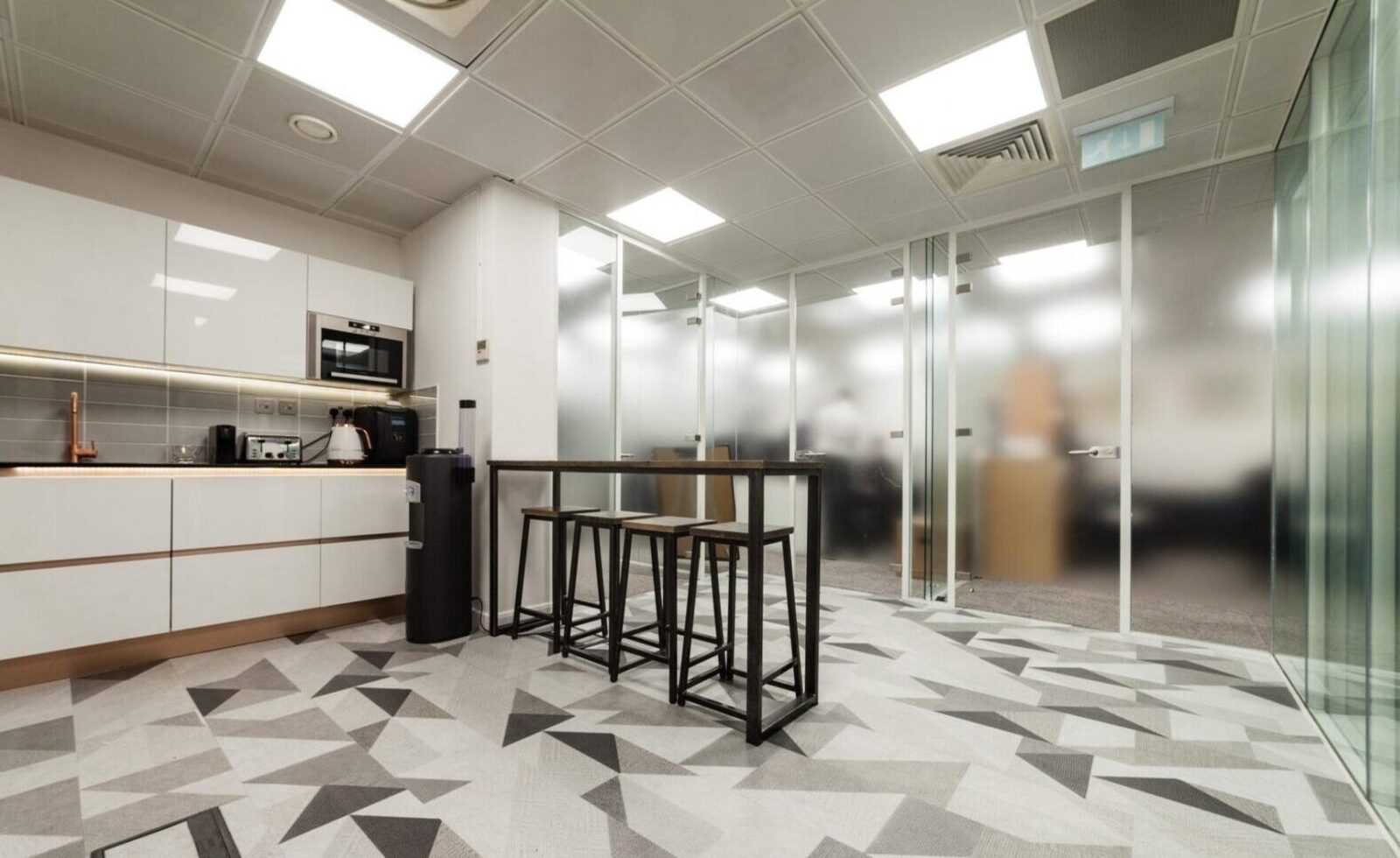
Managing noise pollution is essential for ensuring productivity, privacy, and comfort in various environments. Acoustic glass has emerged as a revolutionary solution, offering superior soundproofing capabilities while maintaining aesthetics and energy efficiency. Acoustic glass partitions and laminated glass options provide a cutting-edge approach to noise control in offices, homes, and industrial workspaces. This guide explores everything you need to know about acoustic glass, including its construction, benefits, applications, cost considerations, and maintenance tips.
If you’re considering an upgrade to enhance sound control in your workspace or home, explore our Acoustic Glass solutions for high-quality, expertly designed options.
What is Acoustic Glass?
Acoustic glass minimises noise levels by absorbing sound waves (also known as soundproof glass). In terms of look and transparency, an acoustic panel is almost identical to regular glass. Acoustic glass is distinguished from other types of glass because it comprises two or more sheets of glass that are laminated or bonded together. To make a single piece of laminated glass out of two sheets of glass, a specialised interlayer known as PVB (polyvinyl butyral) is placed between the two sheets. Because of this, the quantity of sound that can be heard through the glass is reduced.
How Does Acoustic Laminated Glass Work
Acoustic interlayers, such as those made from polyvinyl butyral (PVB) or ethylene-vinyl acetate (EVA), are essential in how sound waves interact with laminated glass. When sound waves hit the glass, they are either absorbed or reflected by the acoustic interlayer. The interlayer’s viscoelastic properties allow it to absorb vibrations, converting sound energy into heat, which helps reduce the amount of noise passing through the glass. Additionally, the interlayer can reflect some sound waves, especially when paired with multiple layers of glass, further preventing noise from entering a space. This combination of absorption and reflection makes acoustic laminated glass highly effective at reducing unwanted noise, especially high-frequency sounds.
The science of soundproofing and its role in reducing high-frequency noise
Soundproofing works by using materials and techniques that either absorb or block sound waves to prevent them from traveling from one space to another. High-frequency noise, such as traffic sounds or voices, is more noticeable and intrusive because it has shorter wavelengths, making it easier for these sounds to pass through materials and into spaces.
To reduce high-frequency noise, soundproofing materials like acoustic foam, laminated glass with special interlayers, and thick curtains are used. These materials absorb sound energy, preventing the vibrations from passing through walls or windows. Some materials, like viscoelastic layers, also help to dampen vibrations, converting sound energy into heat and reducing the intensity of the noise.
Where Should the Acoustic Glass be Used
1. Residential spaces
In urban homes, especially those near noisy areas like roads or train stations, acoustic glass is ideal for windows and doors to reduce high-frequency noise like traffic or voices. It creates a quieter indoor environment, improving comfort and relaxation. Acoustic glass can also be used in partition walls between apartments to ensure privacy and reduce noise transfer between units.
2. Commercial spaces
In offices and commercial settings, acoustic glass partitions help create private spaces like meeting rooms, offering both noise reduction and natural light. These partitions enhance focus and productivity by reducing distractions from the surrounding open-plan areas. Acoustic glass also prevents sound from spilling over from meeting rooms or conference areas, ensuring confidentiality.
3. Industrial spaces
In factories or warehouses, where machinery creates high noise levels, acoustic glass partitions can contain sound, protecting employees and minimizing noise pollution. It helps create quieter work environments, improving safety and productivity while keeping noise from traveling to other areas of the facility, such as offices or break rooms.
4. Specialized spaces
In recording studios, acoustic glass prevents external noise interference and helps maintain sound clarity within the studio. Similarly, in hospitals, it reduces noise in patient rooms or consultation areas, creating a peaceful atmosphere conducive to healing. Educational institutions also benefit from acoustic glass in classrooms and auditoriums, as it helps isolate sound, enhancing learning by reducing distractions and improving sound clarity for lectures or presentations.
Benefits of Acoustic Glass
1. Noise reduction and improved privacy
Acoustic glass significantly reduces noise by absorbing and dampening sound vibrations through its layered construction. This makes it ideal for urban environments, where it can block traffic, machinery, or nearby conversations, creating a quieter indoor atmosphere. In both residential and commercial spaces, acoustic glass improves privacy by preventing sound from traveling between rooms or units, making it a popular choice for offices, meeting rooms, and homes.
2. Enhanced thermal insulation and energy efficiency
Beyond soundproofing, acoustic glass provides thermal insulation by minimizing heat loss in winter and heat gain in summer. This helps maintain a consistent indoor temperature, reducing the need for heating or air conditioning. As a result, it improves energy efficiency, lowering heating and cooling costs and making it an environmentally friendly choice for both residential and commercial spaces.
3. Improved safety
Acoustic glass is often laminated, making it stronger and more resistant to impact. In case of breakage, the interlayer holds the glass fragments together, reducing the risk of injury. This feature enhances safety in areas like schools, hospitals, and offices. Additionally, laminated glass is more resistant to forced entry, providing added security to windows and doors.
4. Versatility in design and aesthetics
Acoustic glass is not only functional but also highly versatile in design. It can be customized in terms of thickness, tint, and finish to complement any architectural style. It allows for natural light while maintaining privacy and noise reduction, making it ideal for both modern homes and commercial buildings. Its ability to combine form and function makes it an attractive option for various design needs.
Technical Insights: Understanding Acoustic Glass Performance
Sound reduction index (Rw)
The sound reduction index (Rw) measures how well a material reduces sound transmission, expressed in decibels (dB). The higher the Rw, the better the noise reduction. Standard glass has an Rw of 25–30 dB, while acoustic glass can achieve 35–50+ dB, significantly reducing external noise.
However, Rw alone doesn’t account for low-frequency sounds like bass vibrations. Corrections like Ctr (traffic noise adjustment) refine the rating for real-world applications.
Laboratory vs. on-site ratings (Rw vs. DnTw)
Rw is measured in controlled lab conditions, but real-world performance varies due to factors like frames, sealing, and building materials. The Weighted Standardized Level Difference (DnTw) reflects actual on-site performance, which is often lower than Rw. For example, an Rw of 45 dB in a lab may result in an on-site DnTw of 40 dB, depending on installation quality.
Acoustic glass thickness options and their impact on performance
Thicker glass enhances soundproofing by increasing mass and reducing vibrations:
6.4mm – 8.8mm: Suitable for homes, blocking moderate noise (Rw 32–36 dB).
0.8mm – 12.8mm: Ideal for offices, improving privacy (Rw 37–42 dB).
16.8mm – 20.8mm: Best for airports, studios, and hospitals (Rw 45+ dB).
Laminated glass with acoustic interlayers (e.g., PVB or EVA) absorbs sound waves, while asymmetrical glazing (using different glass thicknesses) further enhances noise reduction.
How Much Does the Acoustic Glass Cost
The cost of acoustic glass varies depending on the following factors:
1. Materials
The composition and structure of acoustic glass directly impact its cost. Unlike regular float glass, which offers minimal noise reduction, acoustic glass is often made of:
a. Laminated glass with PVB (Polyvinyl Butyral) interlayers, which absorbs sound vibrations.
b. Asymmetrical glazing, where different glass thicknesses are used to disrupt sound waves.
c. Double or triple-glazed units, which further enhance insulation but increase costs.
Thicker and more specialized acoustic glass naturally costs more due to the additional materials and engineering required.
2. Installation
The installation process plays a significant role in both cost and performance. Even the best acoustic glass won’t perform well if not installed properly. Factors that influence installation costs include:
Size and type of glass: Larger panels or custom-shaped glass require more labor and precision.
Type of frames used: Acoustic glass works best with UPVC, timber, or aluminum frames that provide airtight seals. Higher-quality frames increase the overall cost.
Sealing and soundproofing measures: Additional sealing techniques such as silicone acoustic sealants or rubber gaskets improve sound reduction but add to the total price.
Professional expertise: Hiring experienced installers is crucial for ensuring proper fitting and airtight sealing, preventing sound leaks. Professional labor costs vary based on location and complexity.
3. Customizations
Acoustic glass can be customized based on specific needs, which impacts the final cost:
Glass thickness: Thicker glass provides better noise insulation but increases expenses.
Tinting and coatings: UV protection, thermal insulation coatings, or decorative finishes add to the price.
Specialized shapes: Custom-cut glass for unique window shapes costs more than standard rectangular panes.
Smart glass features: Some acoustic glass options integrate privacy technology, such as switchable glass, further raising the price.
Price Comparisons with Other Soundproofing Methods
Acoustic glass is one of the most effective noise-reduction solutions, but it is also more expensive than other soundproofing alternatives. Below is a comparison of costs and effectiveness:
1. Acoustic glass vs. standard glass
Standard single-pane glass offers little to no sound insulation. Costs significantly less but does not reduce external noise.
Acoustic laminated glass: Offers high-level sound reduction (up to 45–50 dB) but costs more due to specialized interlayers and manufacturing processes.
2. Acoustic glass vs. secondary glazing
Secondary glazing (adding an extra glass panel inside an existing window frame) is a cheaper alternative but is not as effective as a fully integrated acoustic glass unit.
While secondary glazing can provide moderate noise reduction, it may not be as aesthetically pleasing or efficient for spaces requiring high-level soundproofing.
3. Acoustic glass vs. soundproof curtains or panels
Soundproof curtains, foam panels, or acoustic wallpaper are much cheaper but provide only minor noise reduction.
These solutions absorb sound rather than block it, making them suitable for echo reduction rather than external noise insulation.
In comparison, acoustic glass effectively blocks external sounds, making it the best choice for high-noise areas.
Maintenance of Acoustic Glass
Cleaning and maintenance tips
Regular cleaning of acoustic glass is essential for maintaining its clarity, appearance, and effectiveness. However, using incorrect cleaning methods can lead to scratches, stains, or reduced performance. Follow these best practices:
1. Use the right cleaning solution
Avoid harsh chemicals, ammonia-based cleaners, or abrasive materials that can weaken the glass surface or affect the acoustic interlayer. Use a mild soap solution mixed with warm water or a vinegar-based glass cleaner for streak-free results. For commercial cleaning solutions, ensure they are safe for laminated or acoustic glass.
2. Use soft, non-abrasive materials
Clean the glass with a microfiber cloth, soft sponge, or rubber squeegee to prevent scratches. Avoid using paper towels or rough fabrics, as they can leave fibers and streaks.
3. Clean both sides of the glass
If the acoustic glass is part of a double-glazed unit, clean both the interior and exterior surfaces regularly to remove dust, smudges, and residue. For hard-to-reach areas, use an extendable squeegee or professional cleaning service.
4. Dry the glass properly
Wipe away excess moisture after cleaning to prevent water spots and streaks. Use a dry microfiber cloth or a lint-free towel to buff the surface gently.
5. Maintain the frames and seals
Regularly check the window or door frames for signs of wear, cracks, or moisture damage. Ensure the acoustic sealants around the edges remain intact to prevent sound leaks. If using UPVC, aluminum, or timber frames, clean them with appropriate solutions based on the material type.
Preventing Damage and Maintaining Soundproofing Capabilities
To maximize the lifespan and performance of acoustic glass, it’s essential to protect it from potential damage and maintain its soundproofing features.
1. Avoid impact damage
Acoustic laminated glass is designed for durability, but strong impacts can weaken or crack it. Avoid slamming doors or windows with acoustic glass. If installed in high-traffic areas, consider adding protective films or barriers. Keep heavy or sharp objects away from the glass surface to prevent scratches and cracks.
2. Prevent seal failure
Over time, seals and acoustic interlayers may degrade due to moisture or exposure to extreme temperatures. Inspect the edges of the glass and replace worn-out seals to maintain airtight insulation. For double-glazed acoustic units, ensure that the gas-filled layer remains intact to prevent a loss of soundproofing efficiency.
3. Control humidity and condensation
Excessive moisture can cause damage to window seals and interlayers, reducing the soundproofing ability. Use dehumidifiers or proper ventilation to prevent condensation buildup, especially in humid environments.
4. Regularly check for acoustic performance
Over time, external factors like frame shifting, seal damage, or interlayer deterioration can reduce soundproofing effectiveness. If noise levels increase, inspect the installation and reapply acoustic seals if necessary. Consider professional recalibration or acoustic testing if significant performance loss is detected.
Sustainability & Energy Efficiency
Reducing energy consumption
Acoustic glass helps regulate indoor temperatures, reducing the need for heating and cooling systems. Many variants incorporate low-emissivity (Low-E) coatings, which minimize heat transfer. In cold weather, these coatings trap heat inside, while in hot weather, they reflect heat away, maintaining a balanced indoor climate. This reduces HVAC system reliance, lowering energy bills and carbon emissions.
Additionally, acoustic glass allows for better natural light penetration, reducing dependence on artificial lighting. This is especially beneficial in commercial spaces where large glass facades can help optimize daylight, leading to lower electricity consumption.
Sustainability in building design
Many modern buildings are designed to meet green certification standards like LEED (Leadership in Energy and Environmental Design) and BREEAM (Building Research Establishment Environmental Assessment Method). Acoustic glass contributes to these standards by improving energy efficiency and indoor air quality.
Some acoustic glass variants are manufactured using recycled materials and sustainable production processes, reducing waste and environmental impact. Additionally, its durability and long lifespan mean fewer replacements, minimizing construction waste over time.
Acoustic glass is an essential component in sustainable architecture, helping reduce energy consumption, improve thermal performance, and support eco-friendly designs. Whether in homes, offices, or public buildings, it provides a long-term, energy-efficient solution that aligns with modern sustainability goals.
Acoustic Glass vs. Double Glazing
| Feature | Acoustic glass | Double glazing |
|---|---|---|
| Sound insulation | Superior sound absorption due to multiple laminated layers with acoustic interlayers. | Reduces noise but is less effective since it relies on air gaps between two glass panes. |
| Construction | Made from two or more glass sheets laminated with an acoustic interlayer, which dampens vibrations. | Consists of two glass panes separated by an air gap, which slows sound transmission. |
| Thermal insulation | Provides good thermal insulation, especially with Low-E coatings. | Offers excellent thermal efficiency, often better than acoustic glass due to trapped air/gas layers. |
| Cost | More expensive due to complex manufacturing, requiring tempering and lamination. | More affordable as it involves two standard glass panes with an insulating gap. |
| Best use cases | Ideal for urban homes, offices, recording studios, and industrial areas where noise reduction is critical. | Suitable for residential and commercial spaces where moderate soundproofing is needed. |
While acoustic glass offers superior noise reduction, double glazing may be more cost-effective for general insulation needs. Consider your budget and noise control requirements before making a decision.
Acoustic Glass vs. Triple Glazing
| Feature | Acoustic glass | Triple glazing |
|---|---|---|
| Sound insulation | Superior noise reduction due to laminated layers with an acoustic interlayer that absorbs vibrations. | Provides better noise reduction than double glazing but may not be as effective as acoustic glass for high-frequency sounds. |
| Construction | Made of two or more glass layers laminated with an acoustic interlayer, designed specifically for soundproofing. | Consists of three glass panes separated by two air or gas-filled gaps, primarily for thermal efficiency. |
| Thermal insulation | Offers good thermal insulation, especially when combined with Low-E coatings. | Provides excellent thermal insulation, better than both double glazing and acoustic glass. |
| Cost | More expensive due to specialized materials and lamination process. | Generally expensive, but cost varies based on glass type and gas filling between panes. |
| Best use cases | Ideal for homes in noisy urban areas, offices, and specialized spaces requiring maximum noise reduction. | Best for cold climates where energy efficiency and thermal insulation are the main concerns. |
While triple glazing excels in thermal efficiency, acoustic glass is the better choice for superior noise reduction. The decision should be based on whether soundproofing or energy efficiency is the priority.
FAQs
Acoustic glass is highly effective at reducing noise pollution, typically lowering sound levels by 35-50 decibels, depending on the glass thickness and lamination. It helps create quieter indoor environments, making it ideal for offices, homes, and commercial spaces.
Acoustic glass is designed to minimize sound transmission, often using multiple layers of glass with a specialized interlayer. Acoustic laminated glass includes a polyvinyl butyral (PVB) or resin interlayer, which enhances sound insulation and provides additional safety and security benefits.
Yes, acoustic glass can be installed in older buildings. It can be customized to fit existing window or partition frames, improving noise insulation without altering the building’s aesthetic or structure.
The cost of acoustic glass partitions varies based on factors such as glass type, thickness, and installation requirements. For an accurate quotation, please contact us with your measurements, and our team will provide a customized estimate.
To maintain acoustic glass, clean it regularly with a mild, non-abrasive glass cleaner and a soft cloth. Avoid harsh chemicals or rough materials that can damage the surface. Periodic inspections can help ensure seals and frames remain intact for optimal performance.












